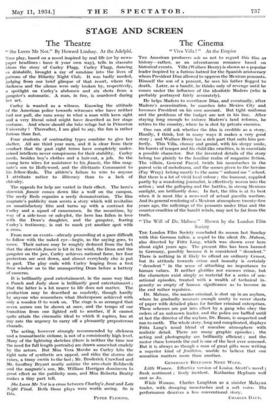STAGE AND SCREEN
The Theatre
" She Loves Me Not." By Howard Lindsay. At the Adelphi.
Tins play, based on a novel inspired by real life (or by news- paper headlines : have it your own way), tells in staccato idiom the story of Curley Flagg. Curley Flagg, dancing en deshabille, brought a ray of sunshine into the lives of patrons of the Hilarity Night Club. It was badly needed, judging from our brief glimpse of that resort, where the darkness and the silence were only broken by, respectively, a spotlight on Curley's abdomen and six shots from a gangster's automatic. A man, in fine, is murdered during her act.
Curley is wanted as a witness. Knowing the attitude of the American police towards witnesses who have neither
bail nor pull, she runs away in what a man with keen sight and a very literal mind might have described as her stage costume. And where should she take refuge but in Princeton University I Thereafter, I am glad to say, the fun is rather furious than fast.
Four students of contrasting types combine to give her shelter. All are third year men, and it is clear from their conduct that the past eight terms have completely under- mined intellects never conspicuous for their stability. Curley needs, besides boy's clothes and a hair-cut, a job. So the
young hero wires for assistance to his fiancee, the film mag- nate's son to Hollywood, and the dilettante Communist to his fellow-Reds. The athlete's failure to wire to anyone I attribute rather to illiteracy than to a lack of chivalry.
The appeals for help are varied in their effect. The hero's shrewish fiancee comes down like a wolf on the campus.
The seedy Reds organize a seedy demonstration. The film
magnate's publicity man scents a story which will revitalize an unsatisfactory film and turns up with a contract for Curley and a squad of cameramen. In the meantime, by way of a side-issue or sub-plot, the hero has fallen in love with the Dean's daughter, and the gangster, fearing Curley's testimony, is out to mark yet another spot with a cross.
From now on events—already proceeding at a pace difficult to follow with the naked eye—begin, as the saying goes, to move. Their nature may be roughly deduced from the fact
that the shrewish fiancee is hit in the wind, the Dean and the gangster on the jaw, Curley achieves national fame, her four
protectors are sent down, and almost everybody else is put in gaol. The play ends with Curley leaping from a first floor window on to the unsuspecting Dean before a battery of cameras.
It is brilliantly good entertainment, in the same way that a Punch and Judy show is brilliantly good entertainment ; that the latter is a lot nearer to life does not matter. The production may be described as masterly, though hardly by anyone who remembers what Shakespeare achieved with only a wooden 0 to work on. The stage is so arranged that seven scenes can be shown at once, and the tempo of our transition from one lighted cell to another, if it cannot quite attain the cinematic ideal to which it aspires, has at any rate the urgency to carry off a pleasantly preposterous charade.
The acting, however strongly recommended by slickness and a transatlantic reelame, is not of a consistently high level.
Many of the lightning sketches (there is neither the time nor the need for full length portraits) arc drawn somewhat crudely by the actors. But Miss Vera Marshe as Curley hits the right note of synthetic sex appeal, and rides the storms she raises, a tinny cretin to the last; Mr. Broderick Crawford and Mr. Geoffrey Bryant neatly satirize the arm-chair Bolshevik and the magnate's son, Mr. William Harrigan domineers to great effect as the publicity man, and Miss Roberta Beatty makes a tiny part tell.
She Loves Me Not is a cross between Charley's Aunt and Late Night Final. Both those plays were worth seeing. So is this.
PETER FLEMING.








































 Previous page
Previous page